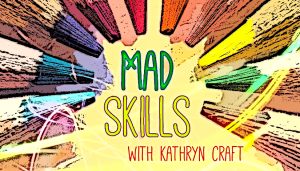Inspirations
photo adapted / Horia Varlan
Fresh perspective—it’s not just a New Year’s theme. It’s also what many of our readers are looking for in our novels.
To be clear, I’m not talking about what drove the structural decision to tell the story through first, second, third-person limited, or third-person omniscient. I’m talking about the way of looking at the world you intend to deliver through that point-of-view vehicle.
In the December 31, 2023 issue of the New York Times, Alexandra Alter wrote about a former financial consultant who had her first glimmer of an idea for a novel in 2013, after receiving this challenge in a fiction writing workshop: “Write a short story from an unusual perspective.” The writer, Shelby Van Pelt, came up with an acerbic octopus who was bored and frustrated by his confinement in an aquarium.
Encouraged by her teacher, Van Pelt began writing vignettes about the octopus, only writing the novel that would become Remarkably Bright Creatures in earnest during the pandemic. It was purchased by Ecco for six figures and hit the NYT list a few weeks after publication, in spring of 2022. Sales stayed steady, and as of December 2023, the title had already gone into 28 printings with 1.4 million copies sold. Why? Alter reports that Beth Seufer Buss, a sales clerk at Bookmarks, an independent bookstore in Winston-Salem, N.C., said, “Everybody who reads it wants other people to read it.”
Other book club darlings have benefitted from similarly bold perspectives. To name a few: The Art of Racing in the Rain by Garth Stein (7 million sold), told from the perspective of an aged dog who believes that once he’s reborn as a human he can better help his grieving owner; The Devil Wears Prada by Lauren Weisberger (13 million sold), a behind-the-scenes look at the world of high fashion told from the perspective of a small-town industry outsider; Where the Crawdads Sing by Delia Owens (12 million copies sold), told from the perspective of a girl who raised and educated herself on the marsh she calls home; and Lessons in Chemistry by Bonnie Garmus (6 million sold), told from the perspective of a female chemist in 1970s who refused to take no for an answer when men continually tried to put her in her place.
Choosing a bold, unusual perspective comes with some risk. Stein fired his first agent (great story) when he expressed, in blunt terms, that he thought the book would never fly; re-agented, it went on to park itself on the New York Times bestseller list for three years. Garmus was also worried when Six-Thirty, the dog in her novel, started expressing his opinions to her. And according to Alter’s article, the editorial assistant at the agency that picked up Van Pelt said, “…it’s either brilliant or it’s bananas, because there’s a talking octopus.”
If handled well, though, the payoff may balance the risk. According to a 2022 article by Amy Odell in LitHub, agent Deborah Schneider said […]
Read MoreWriting can be a lonely pursuit.
Composing books requires hours of solitary work, shutting ourselves away for short 10-minute bursts or hour-long sessions. And not just one shut-away chunk of time. Hundreds. More.
I don’t mind being alone. I’m a solitary person. I run alone, spend the bulk of my weekdays alone while my kids are in school, write alone (most of the time). I live in a house full of people, and maybe that’s why this alone-time is so valuable to me. My days are also filled with frantic activity and loud voices and constant questions. Solitude feels peaceful (though I wouldn’t want it all the time).
Writing can also be a shared pursuit—and perhaps it should be.
That’s not to say we should write with people, or that the only writing that counts is when someone else is in the room. It’s only to say that, like most things, we’re stronger together. And we’re all in this together.
We’re all in this together.
Even in our solitary work, our solitary pursuit of a writing career, it’s important to remember that we should be generous with each other. It’s not a competition. We’re all on the same team. We should be lifting each other up instead of tearing each other down.
I’ve recently seen some alarming activity in the writing world, writers pitted against other writers. Inflammatory things said and done. Public condemnation. It all makes my head and heart hurt. Maybe it’s the social conditioning I had as a kid—if you don’t have something nice to say, just don’t say anything.
That’s not always the answer. I know that. Callouts are necessary. It’s how we change things that need changing. It’s how we flag bad behavior and erroneous beliefs.
But.
We live so publicly as writers. We point out wrongdoings publicly—and I’m not saying we shouldn’t point out bad behavior. But can it not be done less publicly, maybe? Can we at least remember there’s another human being on the other side, however misguided they may be?
So many people are hurting. And writing is a lonely pursuit. We carry our burdens alone. Some of us never learned that’s not the world’s fault. Some of us never learned there’s enough room for all of us. That’s not an excuse for bad behavior. It’s just context. And context is necessary when we want to be empathetic human beings.
What do we owe each other? Certainly not blind allegiance. The recent past has taught us there are writers with problematic belief systems and worldviews. People who do terrible things. People who disappoint others with their actions and words.
But maybe we owe each other dignity? Respect? An I-see-you nod? I don’t have an answer to that question.
As a writing community, though, I believe we do owe each other some level of support and empathy. We’re all trying to do the best we can with what we have—but we’re not perfect. We’re human.
Some of us can lose ourselves in this business. It’s not an easy one. We need each other to lift the lost and broken back up and remind them who they are. Who we are.
When people do egregious things, I don’t always see them through the eyes of compassion. I have to work really hard to get there.
And I’m not always a […]
Read MoreTraditionally, a new year brings us the opportunity for new beginnings. We make New Year’s resolutions about our health, our work, our relationships, or countless other aspects of our lives. And as writers, maybe we think a little harder than the average person about the word resolution, because hey, we like words.
The word resolution almost always comes with “New Year’s” attached, but what about its other forms? Being resolute? Or the act of making a resolution: resolving?
This year, let’s play with words. Let’s dive deep into their origins and let them inspire us. Because we’re writers. Without words, we wouldn’t have much to do.
Per Merriam-Webster, the transitive version of the verb resolve has eight definitions: seven currently in use, one obsolete. Let’s use all eight to power our writing in 2024. (There are also four definitions of the intransitive verb and three of the noun, but the line has to be drawn somewhere, right?) Resolve means:
1. To deal with successfully : clear up. Let us hope that all of our major writing projects fall under this definition this year. Many things are dealt with, but to deal with them “successfully,” that’s the trick. We should be so lucky!
2. To reach a firm decision about. Yep, just as tough, but just as important. Deciding to write a new book, deciding to leave an agent, deciding to self-publish–the ways in which writers have to make major decisions about our projects and careers are nearly countless. May your firm decisions this year be, if not easy, at least thoroughly considered and wisely made.
3. To declare or decide by a formal resolution and vote. OK, I admit that this one is a bit of a reach. But some of us hold leadership positions in official writers’ organizations, and I would say that contributing our time and effort to such organizations is a worthy effort. Being a great writer means more than just producing great writing. Let’s try to further the work of other writers this year, formally or otherwise.
4. Break up, separate; or reduce by analysis. Sometimes our big writing tasks seem too big to handle. May we recognize this year how to make those big tasks smaller and, therefore, achievable.
5. To make (something, such as one or more voice parts or the total musical harmony) progress from dissonance to consonance. If there’s a better accidental definition of a success in writing than “progress from dissonance to consonance,” I haven’t seen it. While some people produce messy first drafts, rewriting them to make them sparkle, and others work hard to make their first drafts shine before they consider them complete, we are all trying to make our work consonant (being in agreement or harmony.) May our work this year exhibit all the consonance we could hope for.
6. To work out the resolution of (something, such as a play). Or, say, a book. Writing a wonderful book almost always involves some struggle. Maybe you’re tangling with a complex thriller plot. Maybe your antagonist’s motivations are turning out to be tough to crack. Maybe your main character’s key relationships are taking more work than you thought you needed in order to fuel the compelling plot you want your book to have. Dive […]
Read MorePlease welcome C. S. Lakin to Writer Unboxed today! C.S. is an award-winning author of more than 30 books, fiction and nonfiction (which includes more than 10 books in her Writer’s Toolbox series). Her online video courses at Writing for Life Workshops have helped more than 5,000 fiction writers improve their craft. To go deep into creating great settings and evoking emotions in your characters, and to learn essential technique, enroll in Lakin’s courses Crafting Powerful Settings and Emotional Mastery for Fiction Writers. Her blog Live Write Thrive has more than 1 million words of instruction for writers meant to help level-up your writing. Welcome, C.S.!
Settings in fiction are not just backgrounds; they are living, breathing components of your story that can immerse readers in your narrative world. Whether it’s the bustling streets of a city or the tranquility of a countryside, the setting plays a crucial role in engaging your readers.
Fiction writers often ignore setting. Or it’s casually brushed over as if the writer begrudgingly knows something ought to be said about the place her character is in and just wants to “get it over with” and move on to the interesting elements in the scene.
An attitude like that shows a complete lack of understand of how powerful setting is.
Setting is perhaps the most versatile and useful element in fiction. It can reveal character motivation, backstory, past trauma, and the story’s cast, as well as reveal emotion and supply tension. If you haven’t considered how powerful setting can be, take some time to work on this key element in your fiction.
To help you get started, let’s explore five essential tips to help you understand the various elements of setting and create memorable, immersive worlds for your characters.
Tip 1: Choose Your Locale with Purpose
The choice of where your story unfolds can significantly impact your narrative. Consider locales that align with your plot, characters, and the emotional atmosphere you want to create. Best-selling author Emily St. John Mandel demonstrates this in Station Eleven, where selects settings like the post-apocalyptic wasteland and the Traveling Symphony’s nomadic existence to enhance the sense of survival, loss, and the enduring human spirit.
In Station Eleven, the world has been ravaged by a devastating flu pandemic, leaving behind a desolate landscape. The setting of a post-apocalyptic world serves a dual purpose. First, it magnifies the sense of isolation and vulnerability felt by the characters, emphasizing the fragility of human existence. Second, it becomes a canvas upon which the resilience and creativity of the characters are painted.
The corridor was silent. It was necessary to walk very slowly, her hand on the wall. A man was curled on his side near the elevators, shivering. She wanted to speak to him, but speaking would take too much strength, so she looked at him instead—I see you, I see you—and hoped this was enough.
No more flight. No more towns glimpsed from the sky through airplane windows, points of glimmering light; no more looking down from thirty thousand feet and imagining the lives lit up by those lights at that moment. No more airplanes, no more requests to put […]
Read Morephoto adapted / Horia Varlan
Last week, while looking for a new show to stream, I came across Doc Martin, about a socially-changed surgeon who, after developing an aversion to blood, leaves London to serve as a family doctor in a small village in Cornwall.
Socially-challenged protagonists, such as Sean Murphy (The Good Doctor) or Sam Gardner (Atypical) on TV, or like Eleanor Oliphant (Eleanor Oliphant is Completely Fine by Gail Honeyman) or Don Tillman (The Rosie Project by Graeme Simsion), are like self-contained story machines. Their outsider status and keen-yet-selective observation skills give them an interesting perspective through which to view a story, their social obstacles are heart-wrenching and never-ending, and their ability to think outside the box makes for many creative ways to “make do” when the needed supplies aren’t readily at hand.
So I was predisposed to like Doc Martin, and excited to see that it was such a popular show that there were ten seasons.
One problem, though: only seasons 8 through 10 were available via PBS. Watching the earlier seasons required yet another streaming subscription. What’s a woman to do if she wants to give Doc Martin a try and she does not care to add to her array of subscription streaming services?
She starts watching in season 8, of course. Because for all the difference it made to me, I was starting from the beginning.
How can that work, when I was entering this character’s story right in the middle?
We readers do it all the time, when we open the front cover of a novel. Starting in Season 8 is an example of what it means to start in medias res, a Latin term that literally means “in the midst of things.”
The season begins with Doc Martin running from his house in a suit and tie and through the middle of a bike race to get to the shoreline, where a fisherman has his hand caught up inside a winch. By insisting on helping, the handsome-yet-bumbling police officer on scene only makes matters worse. The Martins’ nanny quits precipitously because she is marrying the policeman after an eight-week romance. When the happy couple goes to meet with the vicar the day before the wedding, they learn that a substitute pastor has been called to the town on short notice and will be conducting the wedding the next day. The policeman doesn’t want this less experienced curate to officiate, and to make matters worse, Doc Martin has treated her with a medication that makes her nose bleed while counseling the couple, which does nothing to engender trust.
This set up plenty of dramatic and comedic complication for the episode—and while watching, I felt perfectly oriented to it.
A story, after all, doesn’t begin with the Big Bang and end with the Total Annihilation—the reader will always enter, and leave, in the midst of something.
Story DNA at play
We can orient mid-story because every scene that belongs in your book will carry your story’s DNA. Scene structure ensures this: If each of the scenes in your novel marks your protagonist’s difficult yet well-motivated progress toward his […]
Read MoreTherese here to introduce you to today’s special guest, Kristin South! If the name Kristin South rings a bell, it may be that you recognize her as the winner of this year’s full Writer Unboxed Scholarship and/or recall her mentioned in Kim Bullock’s post last week. You may even have met Kristin in Salem last month and formed a fast bond with her, as did many who attended the conference.
I’m thrilled that you all have the chance to meet her now.
Kristin South, like all of you, lives for books. More here, in her own words:
I’ve been writing fiction seriously for ten years. I’ve completed four novels, two of them Middle Grade and two adult. None of them have been published. But I do have about a dozen published academic articles and book chapters and multiple international conference talks to my name, almost all of them in the scintillating and popular field of archaeological textiles from Egypt in the first millennium AD. Total bodice-rippers, every one of ’em. Or at least vaguely related to something like a bodice, if I remember correctly that a bodice is a piece of clothing. I’ve taught middle grade and high school history and been an adjunct at a university, where I taught classes in ancient history and first-year writing. I adored my students and I always enjoyed a good argument about interesting ideas.
Today, Kristin shares not only a critical tipping-point moment for her during this year’s UnConference, she turns that moment into empowering tips for the rest of us. (Because she’s awesome like that.)
Welcome, Kristin! It’s so good to have you with us.
I read a book twenty years ago that has shaped my understanding of the world. (Okay, yes, I’ve read lots of books that have shaped my understanding, but this particular book surprised me with its lasting impact. It didn’t seem to be trying to sway my thinking in any way. It just did.)
The book was How to Be Good, by Nick Hornby, whose better known novels About A Boy and High Fidelity were both made into movies. It tells the story of several people going about their lives with a firm belief that what they do — work as a doctor, help the homeless, seek spiritual enlightenment — makes them a good person. Because of their innate goodness, they each think, everyone else should give them a pass for other things they do that aren’t quite so good (like having an affair or mooching off of others).
Everyone in the story has their own view of what constitutes goodness, so conflicts inevitably arise. Each character insists on his or her own goodness while judging everyone else’s. The book is comic and pointedly accurate in its exaggeration, like other books by Nick Hornby. I think part of the reason it has stuck with me, though, is that while exploring a unified theme it doesn’t force an answer to the question the book poses: What is the right way to be good? Is there a “best” good out there? Apart from the title of the book itself, these issues are never directly addressed, but the book as a whole constantly interrogates them.
What stuck with me, and has informed my way of thinking […]
Read MoreIn the late ‘70s, when I was a freshman at Indiana University in Bloomington, Indiana, a film crew descended upon our quirky little town to shoot a movie. At the time I believe it was called “Bambino,” but that would change. The movie focused on an annual bicycle race the university hosted, called the Little 500 (a reference to the famed Indianapolis 500, the big annual auto race held 50 miles to the north). The Little 500 was the event of the year for students and townspeople alike, and to this day it draws crowds of 25,000 whenever April rolls around.
When you live in smalltown central Indiana, it’s not every day that Hollywood comes calling, and both the city and the university greeted the film project with open arms. It was the talk of the town, and soon we began seeing sections of the campus and surrounding area cordoned off while a cafeteria, courtyard or local street was commandeered to film some scene.
What was the movie about? Nobody really knew, other than that the climactic moment would be a reenactment of our big bicycle race. And – most thrilling of all – there was an open call to attend said reenactment as an extra, since they needed the stadium in which the race was held to be full of people. As a bonus, they also needed a ton of competitive bike riders, and since my dormitory floor had a team that had qualified to compete in the real race, the guys on that team were hired to ride in the reenactment, while the rest of their loyal floormates fake-cheered them on from the stands, hoping to be captured forever on film.
Suffice to say, we were stoked.
It didn’t take long for some of the novelty to wear off. The film crew seemed to be everywhere, and they showed no signs of ever being done. It became tiresome to have to walk around to a rear entrance of an academic hall, because the front of the building was being used for some scene they were shooting.
Even more troubling, we began to notice what they were getting WRONG. We heard talk that the movie would highlight rivalries between students and “cutters” – a derogatory name the filmmakers were using for the local townspeople, harkening back to a bygone era when Bloomington was home to a large workforce of limestone cutters. The problem was, the limestone quarries had been closed for years, there was little or no actual rivalry, and nobody called them “cutters.” “Townies,” maybe. A few called them “stonies” (for “stone cutters”). But what was all this “cutters” nonsense? No, this did NOT bode well.
And then there were the race scenes. Despite the initial surge of interest, it quickly became evident that there was no way to actually fill the stadium where the race was being filmed day after day, because nowhere near enough people were showing up. So the film crew would direct us (yes, yours truly was in some of the crowd scenes) to all shuffle back and forth to different parts of the stadium and sit together in crowded clumps of people. After one shot was completed, we would be ushered to some other section of the stands, and […]
Read MoreA few years ago—almost three! My god, what is time?—my very first post on Writer Unboxed argued against cynicism disguised as reality and in favor of imagining better things through story.
I’d like to add a little something to that message.
To be clear, when I’m talking about cynicism, I’m not talking about stories with dark themes or tragic endings, both of which have a place in literary canon. By cynicism, I mean stories that are told for shock value, to be “edgy” or “realistic” (there are not enough air quotes in the world for that last one)—in essence, narratives that are told with nihilism solely for the sake of making a point to the reader, rather than the sake of the story.
Cynicism can, at times, be easier than imagining something new. It can be protective. If you’re an anxiety sufferer like I am, you know that anxiety is miserable, but it can also feel like a shield: if I think about the worst things that could happen, then I’ll be prepared, and it won’t hurt as much when bad things do happen. That’s of course not how things work (sorry, fellow anxiety-havers), but our brains are quite adept at coming up with illogical ways of protecting us.
But cynicism can protect us in other ways. In particular, in places with greater oppression, expressing an idea for how the world might be improved can draw negative attention from powers that are invested in the status quo.
Dictatorships often begin and are sustained by attacks on art, Toni Morrison argues in her essay “No Place for Self-Pity, No Room for Fear” (published in The Nation in 2015):
the censorship and book-burning of unpoliced prose, the harassment and detention of painters, journalists, poets, playwrights, novelists, essayists. This is the first step of a despot whose instinctive acts of malevolence are not simply mindless or evil; they are also perceptive. Such despots know very well that their strategy of repression will allow the real tools of oppressive power to flourish.
Less seriously, cynicism can protect us from being viewed as weak, naïve, or idealistic—all typically assigned as negative traits. I want to acknowledge that it can be hard, uncomfortable, and even frightening to tell some stories. But that, of course, makes it even more important that they are told.
Read Morephoto adapted / Horia Varlan
I’d told the story too many times, that was the problem.
At first it spilled incessantly. It was as if the horror reflected on my listeners’ faces was the only way I could get it through my head that my experience had been real: my husband of fifteen years, dead, by suicide. But over time, like a river taking its same, inevitable course, my story grew predictable, tumbling over obstacles so familiar their edges had smoothed. I learned where to pull back so as not to make my listener quite so uncomfortable. Where to breathe so I could make it through to the end without sobbing.
I suspected this was why, once I novelized these events, my trusted first reader told me I’d skimmed over the emotional depth of the story’s ending. Her critique of the dark moment, in particular, told me I’d defaulted to this verbal telling mode instead of using the full power of literature to evoke my character’s experience.
“This is what the reader has been waiting for,” she said. How many times had I said the same to my own editing clients? “The very reason you wrote this story. Give us more emotion. Go deeper.”
With these words, I suddenly felt unequal to telling my story.
Of course that’s nothing new either. About three-quarters in, I’d hit this point with every single creative endeavor of my life, whether in choreography or academic writing or fiction, so I was able to recognize this despair for the critical role it plays without abandoning the project. In the story of writing this novel, I had hit my own dark moment. To prevail, I had to learn what I was made of.
I sat with the uneasiness this caused.
And almost let myself off the hook. I mean, I was writing fiction. Who would blame me if I refused to bathe in the blistering tar of memory to explore how my character felt? I thought of the reader willing to plunk down their money for my novel, and yet in the end, would not be served.
The subject was thorny, to say the least. In real life, as I was about to learn how the day-long standoff ended, the emotions I felt were conflicted and shameful and very personally mine. And oddly fractured—when I heard the news that day, the words pierced me through even as I was also somehow watching myself react, in that dissociative way that can be the result of shock. Those emotions had the potential to hold a world of story.
If, on the page, I dared to give them life.
As a reader, I laud the author who is willing to rummage deep in the basement of their psyche, identify the deeply personal emotions stored there, and then lend them to their story. Here’s how I tapped the vulnerability that allowed my conflicted characters to show their messy human emotions.
I leaf through sympathy cards and letters—those drawn by the classmates of my 8- and 10-year-old sons just about unglue […]
Read MoreSpring is moving into a baking early summer here in Australia; the fire season is already upon us. In a few days I will be travelling to Ireland for a writers’ retreat, and the contrast will be dramatic, with autumn storms in that region unusually fierce this year. Tempting as it is to draw parallels with various world events of the present time, or to comment on climate change, this is my final post for 2023 and I want to end the year on a positive note.
I’m lucky enough to live within walking distance of a river, in an area with many wonderful old trees, mostly eucalypts. My suburb and my garden are visited by a variety of birds. We also see quendas (bandicoots) which are expert at tunnelling under fences; opossums; snakes; lizards large and small. I now have a few animal rescues to my credit: not only the unlikely case of the magpie caught in a picket fence, which inspired the opening scene of my work in progress, but quite a few small but significant rescues of drowning bees or lizards. The whole suburb, on the fringe of Perth, Western Australia, is alive with blossoms at this time of year. Jacarandas wear their springtime purple, roses abound in front gardens, and households with lemon trees share their abundant harvest by leaving boxes of fruit out for passers-by to help themselves. No wonder there are so many bees.
My street is short and narrow. Several of the houses, including mine, date back to the early 1900s. One-way traffic; house numbers go up to 20. At one end is a bakery and cafe; at the other, the river. A good street. A street where most people know one another. A street where houses seldom change hands. But sometimes change comes in a flood. So it is with our street. Between autumn and spring the home of a long-term, well-liked resident who had died last year was put on the market and sold. One of most energetic and best known older folk, source of many wonderful tales about growing up in wartime England, suddenly became unable to live independently and moved into residential care; their house was quickly sold. Another resident of the street then died under particularly sad circumstances. A family went away for six months, leaving their house empty. And so on. The rest of us lived our lives, went to work or worked from home, walked our dogs, attended our social events. We exchanged our news when we met on the street. But it felt different. So different. Almost as if the unpredictability of the climate (and world events) had filtered down to suburban level.
Something happened a day or two ago to hearten me. It was a small thing, but it reflected what has been so significant about living in this particular street, which has become something of a community. In an attempted declutter of my over-full house, I rediscovered a practice chanter in a beautiful tartan-lined box. A practice chanter allows a learner to play bagpipes without the full, heroic, marching-into-battle sound, which not all housemates or neighbours love. This chanter was a relic of long ago, from a time when I attempted to […]
Read MoreOctober has never been my favorite month. It seems to stick around much longer than necessary, certainly much longer than the other eleven. It wears steel-toe boots and one of those oilskin raincoats worn by Australian cowboys (and, for some reason, my not-Australian high school boyfriend). October is surly and obstinate. It thinks it’s handsome, and in some lights it is. But it’s mean-handsome. Cruel handsome. Plus, costume’d strangers scare me, especially when they pound on my door after dark and demand things. And candy, even fun- and mini-size, does no one any good.
But this October felt especially ponderous and steel-toed. Terrifying, uncertain, overwhelming. A bad surprise in my family’s health hit hard. And of course, there were (and are) the front pages of the Times or the Chronicle or the Journal plastered with words and images so violent and absurd that I had to work very, very hard to remind myself that Love still has a foothold in the world.
So this October I went in search of aloe for my soul, and found myself returning to one of my most favorite love stories. I first read Their Eyes Were Watching God in 1988 as an 11th grader, then again in a college course, then again in the late 90s as a high school ELA teacher. But this October, instead of reading Zora Neale Hurston’s words on paper, I listened to the late Ruby Dee’s stunning performance of the story. I was reminded of the power of imagery, of character, of Hurston’s prescience. Most of all though, I was struck by Hurston’s syntax.
Syntax is a weird word. A cold word. But in writing, syntax simply refers to the way a sentence is built, constructed, and architected. And isn’t a perfectly constructed sentence a work of art?
Most likely none of you was in my 9th grade English class with Mrs. Stark, the woman responsible for my ability to speak in front of people without anxiety, my understanding of why a teacher must always use breath mints before conferencing with a student, and my love of sentence diagramming.
From my love of sentence diagramming came my love of sentence construction. Mrs. Stark taught me to appreciate the visual beauty of a diagrammed sentence. She also taught me that specific situations require specific sentence structures. So we writers must appreciate and understand the power of syntax.
First, syntax has the power to move readers’ eyeballs.
Of course a reader keeps reading because of the content of each sentence. A reader also keeps reading because the writer propels the reader from sentence to sentence via varied syntax. And that’s important. We need the reader’s eyeballs to move effortlessly, eagerly, efficiently from the upper left to the lower right corner of the page.
Check out Gary Provost’s words from 100 Ways to Improve Your Writing (and feel free to read it aloud):
“This sentence has five words. Here are five more words. Five-word sentences are fine. But several together become monotonous. Listen to what is happening. The writing is […]
Read More
















